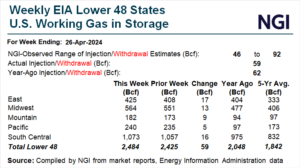Regulatory | NGI All News Access | NGI The Weekly Gas Market Report
BLM Decisions Under Pendley Facing Slew of Environmental Lawsuits
© 2024 Natural Gas Intelligence. All rights reserved.
ISSN © 2577-9877 | ISSN © 1532-1266 | ISSN © 2158-8023 |

Markets
Weekly natural gas cash prices pushed upward, supported by lower production activity and forecasts for intensifying heat. Those catalysts also bolstered futures. NGI’s Weekly Spot Gas National Avg. for the April 30-May 3 period rose 15.5 cents to $1.385/MMBtu. As the trading week closed, leading gainers included Florida Gas Zone 3, up 36.0 cents to…
May 3, 2024By submitting my information, I agree to the Privacy Policy, Terms of Service and to receive offers and promotions from NGI.